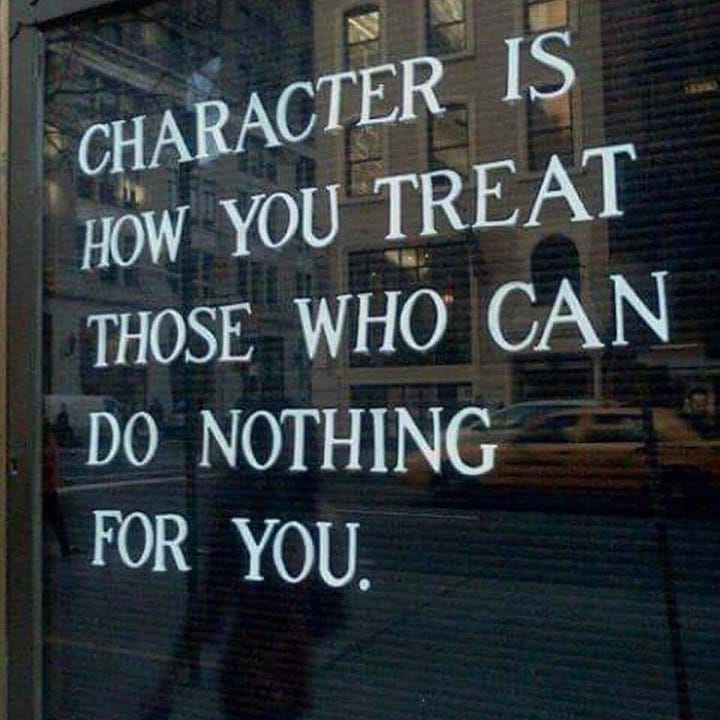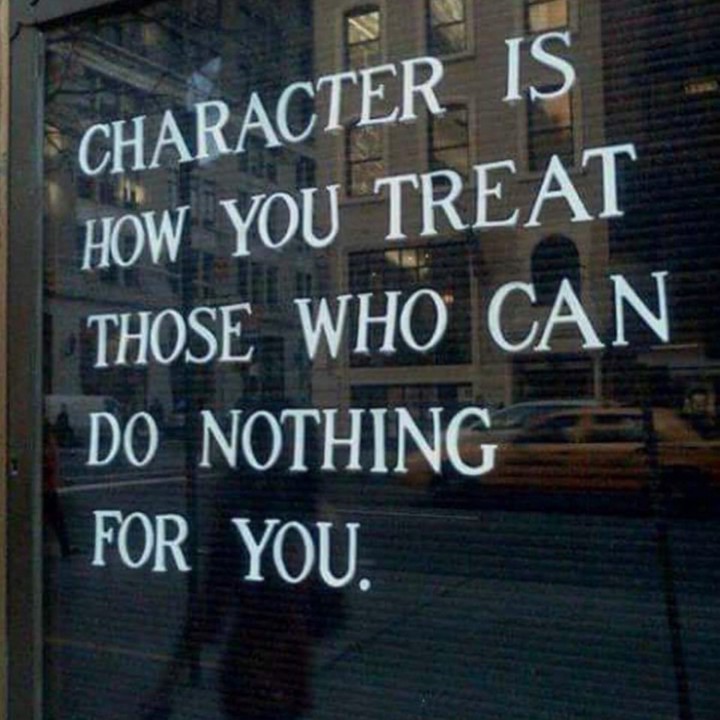
Real Character is Revealed in how you Treat Others
One of the best things about being an entrepreneur is that you are own boss and master of your own fate.
Maybe in theory, but the entrepreneur’s fate, mood, and success are in the hands of non-entrepreneurs — people they encounter day-to-day: potential partners, customers, influencers, connectors, mentors and investors.
They are the gatekeepers for opportunities, sales, funding, and other critical resources. Entrepreneurs live and die by their interactions and responses.
These non-entrepreneurs often hold the keys to that all important milestone, or “big break.”
Luckily, most people are enthusiastic and excited about the prospects of helping entrepreneurs. They have good intentions, however, interacting with entrepreneurs often reveals their worst business behavior. Despite good intentions, they are the worst offenders of bad business behavior.
Real Character is Revealed in how you Treat the Entrepreneurs:
Do you do any of these things?
1 — Ignore Emails
Ignoring unsolicited spam is OK, but it’s bad form not to return an email from a real person — particularly if it’s just a brief question. Even worse is ignoring an email from someone who you really know, or from a colleague.
Organizational Psychologist Adam Grant famously wrote in the NY Times:[1]
“Yes, we’re all overwhelmed with email … But volume isn’t an excuse for not replying. Ignoring email is an act of incivility. “I’m too busy to answer your email” really means “Your email is not a priority for me right now.”
That’s a popular justification for neglecting your inbox … but there’s a growing body of evidence that if you care about being good at your job, your inbox should be a priority.”
2 — Pretend Promises
Do you make polite promises, or offer help without ever following through? Do you over-promise and then end up backpedaling?
How about that first meeting? To the entrepreneur, it was an enthusiastic start of business relationship. You were going to try out their product, or introduce them to a decision-maker, or maybe even partner with their company. Then days, weeks or months pass by. The momentum fizzled because you got caught up with other priorities.
This behavior is devastating for entrepreneurs. It can destroy an entrepreneur’s spirit and even derail their entire business.
We all want to be in a position to help. It makes us feel good if we have the power to help. No one really wants to admit that they don’t have power. So, if you are not empowered to make a deal or buy a product then be candid, and don’t make promises, or imply that you can help.
3 — Dissing
Do you dismiss, denounce, disparage? Deride, downplay, or detract?
No?
But how often do you poke holes in a new idea, quickly point out the flaws, or hidden difficulties. Yeah, I know. — you’re just being honest; tough-love and all that — but are your sure you’re not just wanting to show the entrepreneur that you know more? That you’re smarter?
The entrepreneur is discussing their idea or new product with you because they thought you were a forward-thinking innovator. When your first reaction is to poke holes in the idea or find all the little problems — then you just proved them wrong: You’re not an innovator or an ally to the entrepreneur. You’ve become “that guy” — the negative know-it-all and armchair quarterback — who will only discourage and delay innovation.
4 — Ghosting
After the first 1–2 email exchanges do you simply stop replying? Particularly after implying that you can help the entrepreneur — or after you’ve told them that you’re interested in their product?
Perhaps you’ve replied to their email with an enthusiastic offer to talk on the phone, or to even meet. But then, when the entrepreneur attempts to follow up and you go silent. This is the very definition of ghosting and it leaves the entrepreneur asking ‘did I say or do something wrong?’, ‘did something happen to you?’
Ghosting is different than merely not returning emails.
Maybe you don’t do it deliberately or even consciously. But how often do you miss scheduled calls, Zoom meetings, or even in-person meetings — canceling at the last minute without prior notice or explanation?
OK. Maybe you just forgot or never put it on your schedule. It happens. But if you do this often enough, it means you’re either arrogant or just inept. Pick one.
Ghosting is the ultimate in boorish, arrogant business behavior.
Acceleration Partners CEO Robert Glazer puts it well: [2]
Ghosting is disrespectful; disrespect creates ill will and distrust that is often irreparable. Being avoidant and indifferent in your communication conveys cowardice. It’s a small world out there. You never know when your ghosting may come back to haunt you.
Karma
Glazer is right. One of the more strangely fulfilling phenomena that happens when you’re in business for a long time is: ‘what comes around goes around.’
People who wouldn’t lift finger to help you, and people who disappeared when you needed them most, end up calling you years later when they need your help. They end up bewildered and frustrated when no one is eager to help them now.
Which leads to a modern truism:
Karma isn’t a bitch — it’s a mirror.
No, Not me!
You may be saying: I help people all the time. I’m a visionary and try to give back. Are you sure?
When you ignore an email or cancel a meeting, is your excuse: I’m busy; I can’t respond to every random message, or attend every meeting?
You may be busy, but unless you’re locked in a lab, cubical or solitary confinement — empathy, networking, and people skills are the new requirements for success.
Some people make a grand display of virtue signaling on social media – imploring others about being generous, compassionate, and cooperative. Yet the same people won’t reply to a personal email for a question, to or connection request because they don’t see “what’s in it for them.”
Quid Pro Quo is the short game.
Helping others is the long game — with much better payoffs.
CJ Cornell is a serial entrepreneur, investor, advisor, mentor, author, speaker, and educator. As an entrepreneur, CJ Cornell was a founder of more than a dozen successful startup ventures that collectively attracted over $250 million in private funding; created nearly a thousand new jobs; and launched dozens of innovative consumer, media, and communications products — that have exceeded $3 billion in revenues.
He is the author of the bestselling “The Age of Metapreneurship — A Journey into the Future of Entrepreneurship.”

And the upcoming “The Startup Brain Trust — A Guidebook for Startups, Entrepreneurs, and the Mentors that Help them Become Great.”
Follow him @cjcornell or visit: www.cjcornell.com
Image Credit:
https://www.pexels.com/photo/closeup-photo-of-bald-eagle-133356/
✓ Free to use. ✓ No attribution required.
(1) https://www.nytimes.com/2019/02/15/opinion/sunday/email-etiquette.html
(2) ** Answer by Robert Glazer, Founder and CEO of Acceleration Partners, on Quora:
